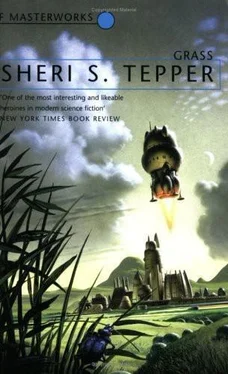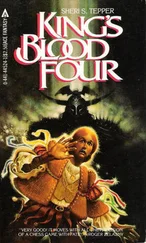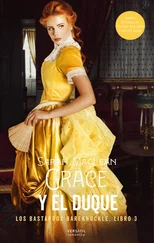Sheri Tepper - Grass
Здесь есть возможность читать онлайн «Sheri Tepper - Grass» весь текст электронной книги совершенно бесплатно (целиком полную версию без сокращений). В некоторых случаях можно слушать аудио, скачать через торрент в формате fb2 и присутствует краткое содержание. Город: London, Год выпуска: 2002, ISBN: 2002, Издательство: Gollancz, Жанр: Фантастика и фэнтези, на английском языке. Описание произведения, (предисловие) а так же отзывы посетителей доступны на портале библиотеки ЛибКат.
- Название:Grass
- Автор:
- Издательство:Gollancz
- Жанр:
- Год:2002
- Город:London
- ISBN:9781857987980
- Рейтинг книги:4 / 5. Голосов: 1
-
Избранное:Добавить в избранное
- Отзывы:
-
Ваша оценка:
- 80
- 1
- 2
- 3
- 4
- 5
Grass: краткое содержание, описание и аннотация
Предлагаем к чтению аннотацию, описание, краткое содержание или предисловие (зависит от того, что написал сам автор книги «Grass»). Если вы не нашли необходимую информацию о книге — напишите в комментариях, мы постараемся отыскать её.
Grass — читать онлайн бесплатно полную книгу (весь текст) целиком
Ниже представлен текст книги, разбитый по страницам. Система сохранения места последней прочитанной страницы, позволяет с удобством читать онлайн бесплатно книгу «Grass», без необходимости каждый раз заново искать на чём Вы остановились. Поставьте закладку, и сможете в любой момент перейти на страницу, на которой закончили чтение.
Интервал:
Закладка:
“How do you know it is spring?” she demanded, turning away from the window toward him.
They stood amid high, echoing walls in an arctic and empty chamber of what was to be the embassy. The distant ceiling curved in ivory traceries of plaster groins; tall glass doors opened through gelid arches onto a balustraded terrace; pale glowing floors reflected their movements as though from polished ice through a thin, cold film of dust. Though it was one of the main reception rooms of the estancia, it did not seem to require furnishings or curtains across the frigid glass. It seemed content with its numbing vacancy, as did the dozen other rooms they had visited, each as tall, wintery, and self-contained as this one.
The estancia, though conscientiously maintained, had been untenanted for some time, and Marjorie, Lady Westriding, had the feeling that the house preferred it that way. Furniture would be an intrusion in these rooms. They had accommodated themselves to doing without. Rejecting carpets and curtains in favor of this chill simplicity, they were content.
Unaware of her brief fantasy the Obermun suggested, “Look at the grasses along the stairs to the terrace. What do you see?”
She stared, convincing herself at last that the amethyst shadow she saw there was not merely an effect of the often very tricky light. “Purple?” she asked. “Purple grass?”
“We call that particular variety Cloak of Kings,” he said. “There are hundreds of grasses on this world, of many shapes and sizes and of an unbelievable array of colors. We have no flowers in the sense someone from Sanctity would understand, but we do not lack for bloom.” He used the word “Sanctity,” as did most of those they had encountered upon Grass, as a virtual synonym for Terra. As before, she longed to correct him but did not. The time when Sanctity had been contained on Terra was many generations past, but there was no denying its ubiquity and virtual omnipotence on man’s birthplace.
“I have read Snipopean’s account of the Grass Gardens of Klive,” she murmured, not mentioning it was almost the only thing she had been able to read about Grass. Sanctity knew nothing. Terra knew nothing. There was no diplomatic contact and no information could be transmitted and returned much more quickly than the Yrariers themselves could arrive — months after Sanctity had begged permission, months after permission for an ambassador had been given, months after Roderigo’s old uncle — now long since dead — had begged them to come. All had happened as swiftly as possible, and yet almost two Terran years had passed since these aristocrats had said they would allow an embassy. Now the Yrariers must make up for lost time. She went on calmly, “The Grass Gardens of Klive are at the estancia of the Damfels, I believe?”
He acknowledged her slight interrogative tone with a nod. “Btw Damfels,” he said, emphasizing the honorific “Stavenger and Rowena bon Damfels would have been pleased to welcome you, but they are in mourning just now.”
“Ah?” she said in a questioning tone.
“They recently lost a daughter,” he said, an expression of distaste and embarrassment upon his face. “At the first spring Hunt. A hunting accident.”
“I sympathize with their sorrow.” She paused for a moment, allowing her own face to reflect an appropriately assessed measure of compassion. What could she say? Would too much sympathy be effusive? Would curiosity be misplaced? A hunting accident? The expression on the man’s face indicated it would be safer to let more information be given rather than ask for it. She waited long enough for the Obermun to continue, and when he did not she returned to the safety of the former subject. “What does it mean when the Cloak of Kings shows purple along its bottom?”
“The color will be halfway up the stems in a matter of days, and you will begin to see the flush of the gardens — rose and amber, turquoise, and emerald. This estancia was named Opal Hill because of the play of color each spring evokes. These gardens are young, but well laid out. The flat place there at the bottom of the stairs is what we call a first surface. All grass gardens have such an enclosed, flat area of low turf It is the place from which all garden walks begin. From that place, trails lead from prospect to prospect. In a week, the winds will soften. We have entered upon the spring collect. By the end of the period—”
“A period being?”
“Sixty days. An arbitrary choice made by the earliest settlers. When a year extends over two thousand days, it is hard to make shorter lengths of time mean much. A period is sixty days, ten periods make a collect, four collects — one corresponding to each season — make a year. We reflect our Terran ancestry by dividing each period into four fifteen-day weeks, but there is no religious significance attached.”
She nodded her understanding, risked saying, “No Sabbath.”
“No planetary religious holidays of any kind. Which is not to say there is no religion, simply that matters of faith have been irrevocably removed from any civil support or recognition. Our ancestors, while all benefiting from noble blood, came from a variety of cultures. They wished to avoid conflict in such matters.”
“We have much to learn,” she said, fingering the limp leather of the little testament in her pocket. Before they left Terra, Father Sandoval had sent it to the Church in Exile to be blessed by the Pope. Father Sandoval, claiming to know her better than she knew herself, had said it would help reconcile her to the experience after her first enthusiasm wore off. So far she had noticed little reconciliation. “The authorities at Sanctity told us almost nothing about Grass.”
“If you will forgive my saying so, Terrans know almost nothing about Grass. They have not, in the past, been particularly interested.”
Again that confusion between Terra, the planet, and Sanctity, the religious empire. She nodded, accepting his not ungentle chiding. Either way, it was probably true enough. Terrans had not cared about Grass. Not about Semling, or The Pearly Gates, or Shame, or Repentance, or any of the hundred human-settled planets far and adrift in the sea of space. What was left of human society on Terra had been too busy forcing its own population down and restoring an ecology virtually destroyed by the demands of an insatiable humanity to concern itself with those emigrations that had made its own salvation possible. Sanctity squatted on the doorstep of the north, regulating the behavior of its adherents wherever it could, while everyone else on Terra got on with trying to survive. Once each Terran year Sanctity celebrated with flags and speeches and off-planet visitors. The rest of the time Sanctity might as well have been somewhere else.
Sanctity was not Terra. Terra was home, and this was not. Though Marjorie wanted to say this loudly, with emotion, she restrained herself.
“Will you show me the stables?” she inquired. “I assume our horses have been revived and delivered?”
Until this moment she had seen nothing approaching real discomfort on the aristocrat’s face. He had met them in the reception area of the revivatory at the port, seen to the collection of their belongings, provided them with two aircars to bring them to the estancia which they were to occupy — aircars they were to retain during their “visit,” he had said. He had remained to guide her through the summer domestic quarters while her husband, Roderigo Yrarier, toured the winter quarters and the offices of the new embassy with Eric bon Haunser, a younger but no less dutiful member of the Grassian aristocracy. Throughout this not inconsiderable itinerary, Obermun bon Haunser had been smooth and proper to a fault, but the question of the horses made him uncomfortable. If he did not precisely lose countenance, something at the corners of his mouth let composure slip, though subtly and only momentarily.
Читать дальшеИнтервал:
Закладка:
Похожие книги на «Grass»
Представляем Вашему вниманию похожие книги на «Grass» списком для выбора. Мы отобрали схожую по названию и смыслу литературу в надежде предоставить читателям больше вариантов отыскать новые, интересные, ещё непрочитанные произведения.
Обсуждение, отзывы о книге «Grass» и просто собственные мнения читателей. Оставьте ваши комментарии, напишите, что Вы думаете о произведении, его смысле или главных героях. Укажите что конкретно понравилось, а что нет, и почему Вы так считаете.












